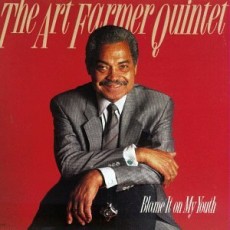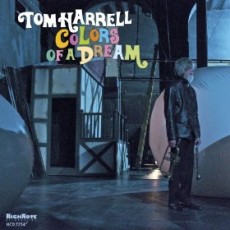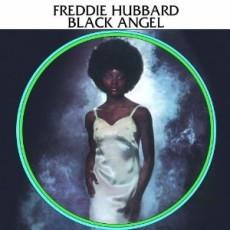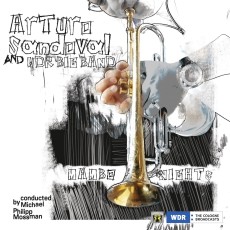
Daily Dose Of Jazz…
Arthur Stewart Farmer was born August 21, 1928, an hour before his twin brother, in Council Bluffs, Iowa. Their parents, James Arthur Farmer and Hazel Stewart Farmer, divorced when the boys were four, and their steelworker father was killed in a work accident not long after. He moved with his grandfather, grandmother, mother, brother and sister to Phoenix, Arizona when he was still four. He began playing piano while in elementary school, then moved on to bass tuba and violin before settling on cornet and then trumpet at the age of thirteen. He taught himself to read music and practiced his new main instrument, the trumpet.
Farmer and his brother moved to Los Angeles in 1945, attending the music-oriented Jefferson High School where they got music instruction and hung out with other developing musicians such as Sonny Criss, Ernie Andrews, Big Jay McNeely and Ed Thigpen. By sixteen he was playing trumpet professionally, performing in the Horace Henderson, Jimmy Mundy and Floyd Ray bands, among others.
Art left school to tour with a group led by Johnny Otis, but this job lasted for only four months, as Farmer’s lip gave out, becoming lacerated through underdevelopment of his technique. He then received technique training in New York, auditioned unsuccessfully for Dizzy Gillespie and returned to the West Coast in 1948 as a member of Jay McShann’s outfit.
Farmer played and toured with Benny Carter, Wardell Gray, Roy Porter and Gerald Wilson in the early 50s.He would record his first studio session with Big Joe Turner and Pete Johnson, and gained great attention with his piece titled “Farmer’s Market”. He joined Lionel Hampton’s orchestra, toured Europe, became a member of Teddy Charles’ New Directions band, relocated to New York and in 1953, had his first recording session as leader for Prestige titled The Art Farmer Septet.
Over the course of his career he has worked with Quincy Jones, Gigi Gryce, Horace Silver, Gerry Mulligan, Thelonious Monk, and Charles Mingus, appeared on the Steve Allen show, Newport Jazz Festival, and two films – I Want To Live and The Subterraneans. As a member of Jazz at the Philharmonic he toured Europe again, that helped him gain an international reputation. He formed the Jazztet with Benny Golson, assited the careers of McCoy Tyner and Granchan Moncur, appeared in the photo Great Day In Harlem, recorded prolifically and led groups through the Sixties, and took a job in the orchestra pit on Broadway as jobs in jazz dried up.
He would settle in Vienna and divide his time between Europe and New york, revive the Jazztet with Golson, form a quintet with Clifford Jordan as a member, lost 30 pounds, quit smoking and drinking, avoided drugs, performed regularly, was awarded the Austrian Gold Medal of Merit, and was selected as a National Endowment for the Arts Jazz Master in 1999. A few months later on October 4, 1999 bebop trumpeter, flugelhorn and flumpet player and bandleader Art Farmer passed away of a heart attack at his New York Manhattan home. He was 71.
More Posts: flugelhorn,flumpet,trumpet

Daily Dose Of Jazz…
Tom Harrell was born on June 16, 1946 in Urbana, Illinois but by 5 was growing up in San Francisco. He started playing trumpet at eight and within five years, started playing gigs with local bands. Graduating from Stanford University with a music composition degree, he joined Stan Kenton’s orchestra, touring and recording with them throughout 1969.
After leaving Kenton, the post-bop trumpeter played with Woody Herman, Azteca, Horace Silver, the Sam Jones-Tom Harrell Big Band, the Lee Konitz Nonet, George Russell and the Mel Lewis Orchestra. Through the ‘80s he became a pivotal member of the Phil Woods Quintet making seven albums with the group.
Harrell is also plays flugelhorn and is a composer and arranger who has collaborated and recorded albums with Bill Evans, Dizzy Gillespie, Ronnie Cuber, Bob Brookmeyer, Lionel Hampton, Bob Berg, Bobby Shew, Joe Lovano, Charlie Haden’s Liberation Orchestra, Art Farmer, Charles McPherson and Kathleen Battle among others.
Since 1989 Harrell has led his own groups, usually quintets but has expanded ensembles such as chamber orchestra with strings and big bands. He has appeared at virtually every major jazz club and festival venues, and recorded under his own name for such record labels as RCA, Contemporary, Pinnacle, Blackhawk, Criss Cross, Steeplechase, Chesky and HighNote Records.
The Grammy-nominated artist has arranged and composed for Carlos Santana, Arturo O’Farrill, Metropole Orchestra and other big bands as well as his compositions being recorded by Ron Carter, Kenny Barron, Tom Scott, Chris Potter, Steve Kuhn and Hank Jones to name a few. In recent years he has formed and recorded with piano-less sextet “Colors Of A Dream” and piano-less quartet TRIP.
Despite his well-documented schizophrenia, Tom Harrell has successfully coped with the illness through medication and has become an influential figure in the jazz world. Throughout his career he has won numerous awards and grants, including multiple Trumpeter of the Year awards from Down Beat magazine, SESAC Jazz Award, BMI Composers Award, and Prix Oscar du Jazz. He has amassed a recorded discography of over 260 albums and continues to actively compose, record and tour extensively around the world.
More Posts: arranger,composer,flugelhorn,trumpet

Daily Dose Of Jazz…
Frederick Dewayne Hubbard was born on April 7, 1938 in Indianapolis, Indiana and started playing the mellophone and trumpet in his school band at Arsenal Technical High School. Upon the recommendation of one-time Stan Kenton sideman, trumpeter Lee Katzman, he began studies at the Arthur Jordan Conservatory of music. During his teens he played with Wes and Monk Montgomery, bassist Larry Ridley and James Spaulding.
1958 saw a 20-year old Hubbard in New York working with the likes of Philly Joe Jones, Sonny Rollins, Slide Hampton, Eric Dolphy, J. J. Johnson and Quincy Jones. Three years later in ’61 he recorded his debut as a leader, Open Sesame with Tina Brooks, McCoy Tyner, Sam Jones and Clifford Jarvis. That same year he replaced Lee Morgan in Art Blakey’s Jazz Messengers and for the next five years played and recorded on a succession of albums. Leaving Blakey in 1966 he formed the first of several small groups with among others Kenny Baron and Louis Hayes.
Throughout his hard bop and post bop career he recorded profusely for Blue Note, Atlantic, CTI, Columbia and a host of subsidiaries and smaller labels playing with the likes of Ornette Coleman, John Coltrane, Wayne Shorter, Eric Dolphy, Don Cherry, Herbie Hancock, Oliver Nelson, Stanley Turrentine, George Benson, Richard Wyands, Eric Gale, Ron Carter, Jack DeJonette, Dexter Gordon, Curtis Fuller and the list goes on.
Freddie Hubbard, NEA Jazz Master, had an unmistakable and influential tone that greatly contributed to new perspectives for modern jazz and bebop. He passed away from a heart attack on December 29, 2008.
More Posts: cornet,flugelhorn,french horn,mellophone,trumpet

Daily Dose Of Jazz…
Arturo Sandoval was born in Artemisa, Cuba on November 6, 1949 and began to play music at age 12 in the village band. After playing many instruments, he fell in love with the trumpet. In 1964, he began three years of serious classical trumpet studies at the Cuban National School of Arts. By the age of 16 he had earned a place in Cuba’s all-star national band and was totally immersed in jazz influenced by Charlie Parker, Clifford Brown and with Dizzy Gillespie as his idol and later mentor and colleague.
In 1971 he was drafted into the military. Luckily, Sandoval was still able to play with the Orquesta Cubana de Musica Moderna. In Cuba, Sandoval co-founded the band Irakere with Chucho Valdes and Paquito D’Rivera. They quickly became a worldwide sensation. Their appearance at the 1978 Newport Jazz Festival introduced them to American audiences and garnered them a recording contract with Columbia Records.
Arturo defected to the United States while touring in Spain with Dizzy in 1990, becoming a naturalized citizen in 1999 and has enjoyed a successful career. He has played with Woody Herman, Herbie Hancock, Woody Shaw, Stan Getz, Celine Dion, Tito Puente, Patti LaBelle, Frank Sinatra, Paul Anka, Gordon Goodwin and numerous others.
His life was the subject of the 2000 TV film For Love or Country: The Arturo Sandoval Story, starring Andy Garcia. He currently continues to perform, tour and record around the globe.
More Posts: flugelhorn,piano,trumpet

Daily Dose Of Jazz…
Terumasa Hino was born in Tokyo, Japan on October 25, 1942. His initial exposure to music began at four was with his father, a step dancer and trumpeter, taught him tap-dancing. He soon began performing with the trumpet when he was 9 years old, later adding flugelhorn to his arsenal. In the Fifties, Hino began his career as a professional jazz musician and by 1965 after working with several noted jazz artists, he joined Hideo Shiraki’s Quintet. He remained with the band till 1969, leaving to lead his own band full-time, which he formed in 1964.
1969 saw Hino releasing his successful third album “Hi-nology” to critical acclaim and was soon performing at jazz festivals and clubs worldwide before settling in New York City in 1975. Once there he found work with numerous jazz musicians including among others Gil Evans, Elvin Jones, Jackie McLean, Ken McIntyre, Dave Liebman, Hal Galper, Carlos Garnett, Greg Osby and Sam Jones in between leading his own group, which is credited by the jazz guitarist John Scofield for him turning from fusion to jazz.
From the 1980s, he spent more time in Japan and helped incorporate several elements such as avant-garde and fusion into his music. Trumpeter Terumasa Hino has a current catalogue of fifty-one albums and he continues to perform, record and tour around the world.
More Posts: flugelhorn,trumpet


